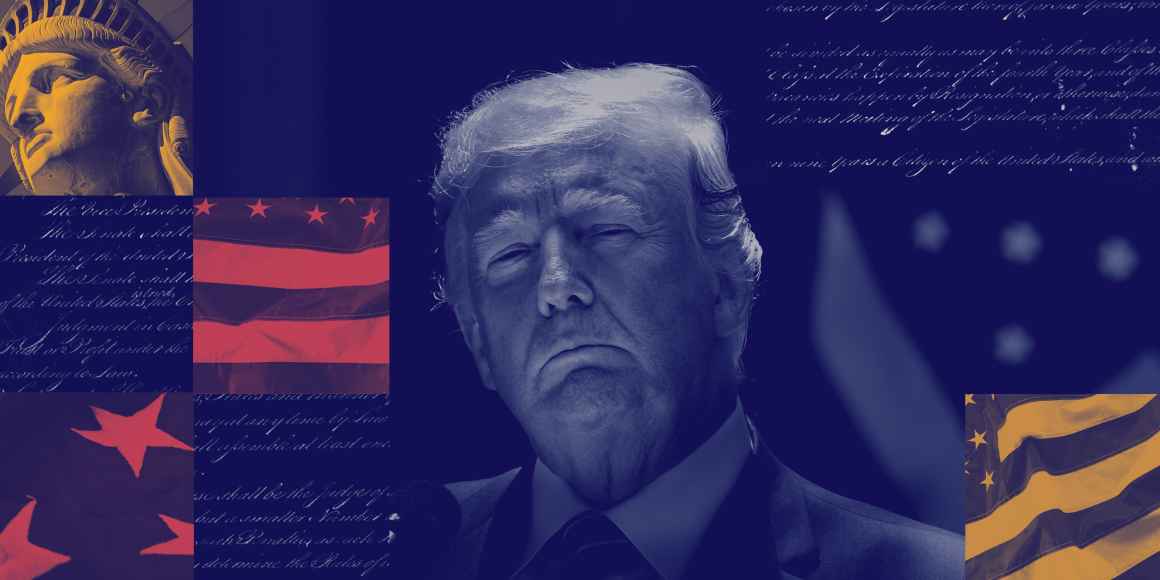Voting Rights
League of Women Voters Education Fund v. Trump
On March 25, 2025, in a sweeping and unprecedented Executive Order, President Trump attempted to usurp the power to regulate federal elections from Congress and the States. Among other things, the Executive Order directs the Election Assistance Commission—an agency that Congress specifically established to be bipartisan and independent—to require voters to show a passport or other citizenship documentation in order to register to vote in federal elections. If implemented, the Executive Order would threaten the ability of millions of eligible Americans to register and vote and upend the administration of federal elections.
On behalf of leading voter registration organizations and advocacy organizations, the 51Ć·˛č and co-counsel filed a lawsuit to block the Executive Order as an unconstitutional power grab.
Status: Ongoing
View Case
Learn About Voting Rights
Featured
U.S. Supreme Court
Aug 2025

Voting Rights
Callais v. Landry
Whether the congressional map Louisiana adopted to cure a Voting Rights Act violation in Robinson v. Ardoin is itself unlawful as a gerrymander.
New Hampshire
Jul 2025
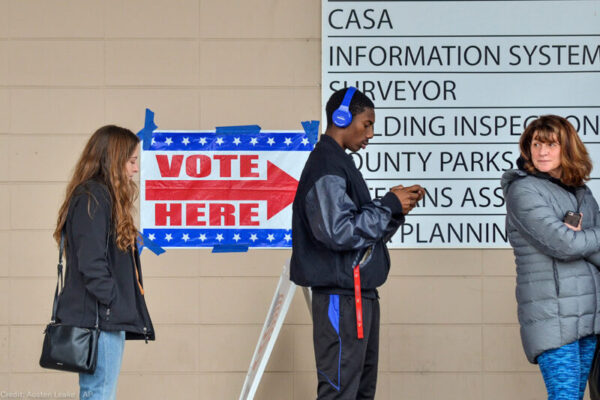
Voting Rights
Coalition for Open Democracy v. Scanlan
This lawsuit challenges HB 1569, a new law that will make New Hampshire the only state to require every person to produce documentary proof of citizenship when they register to vote for both state and federal elections. It also challenges HB 1569’s elimination a preexisting protection for voters—namely, an affidavit option that allowed voters who faced surprise challenges to their eligibility at the polls to swear to their qualifications and cast a ballot. Accordingly, HB 1569 violates the First and Fourteenth Amendments of the U.S. Constitution by placing substantial burdens on New Hampshirites at all stages of the voting process, and will arbitrarily disenfranchise hundreds, if not thousands of qualified voters.
Georgia Supreme Court
Jun 2025

Voting Rights
Eternal Vigilance Action, Inc. v. Georgia
The 51Ć·˛č and partner organizations intervened in this case to represent the rights of voters and voting-rights organizations in a case challenging a number of rules passed by the Georgia State Election Board. We challenged the rule requiring that the number of votes cast be hand counted at the polling place prior to the tabulation of votes. In a critical victory for Georgia voters, in June 2025, the Georgia Supreme Court upheld a lower court’s decision permanently blocking the rule requiring hand counting of ballots at polling places before tabulation — a process widely criticized for risking delays, ballot spoliation, and voter disenfranchisement.
U.S. Supreme Court
May 2025

Voting Rights
Racial Justice
Allen v. Milligan
Whether Alabama’s congressional districts violate Section 2 of the Voting Rights Act because they discriminate against Black voters. We succeeded in winning a new map for 2024 elections which, for the first time, has two congressional district that provide Black voters a fair opportunity to elect candidates of their choosing despite multiple attempts by Alabama to stop us at the Supreme Court. Despite this win, Alabama is still defending its discriminatory map, and a trial was held in February 2025 to determine the map for the rest of the decade.
In May 2025, a federal court ruled that Alabama's 2023 congressional map both violates Section 2 of the Voting Rights Act and was enacted by the Alabama Legislature with racially discriminatory intent.
South Carolina Supreme Court
Jan 2025

Voting Rights
League of Women Voters of South Carolina v. Alexander
This case involves a state constitutional challenge to South Carolina’s 2022 congressional redistricting plan, which legislators admit was drawn to entrench a 6-1 Republican majority in the state’s federal delegation. Plaintiff the League of Women Voters of South Carolina has asked the state’s Supreme Court to conclude that the congressional map is an unlawful partisan gerrymander that violates the state constitution.
Texas
Oct 2024
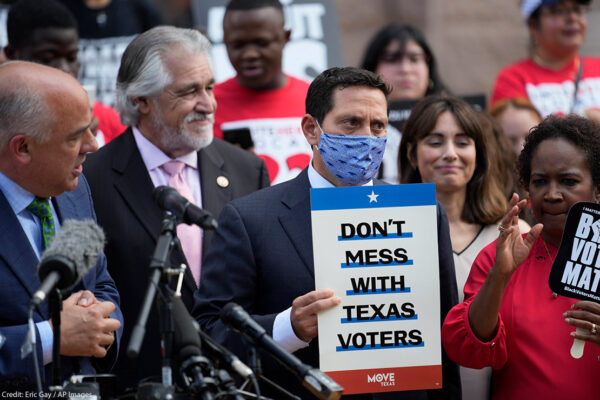
Voting Rights
OCA-Greater Houston v. Paxton
Texas has growing Hispanic and Black populations that helped propel record voter turnout in the November 2020 election. The Texas Legislature responded to this increased civic participation with an omnibus election bill titled Senate Bill 1—SB 1 for short—that targeted election practices that made voting more accessible to traditionally marginalized voters like voters of color, voters with disabilities, and voters with limited English proficiency. Since 2021, SB 1 has resulted in tens of thousands of lawful votes being rejected, and it remains a threat to democracy in Texas.
All Cases
156 Voting Rights Cases
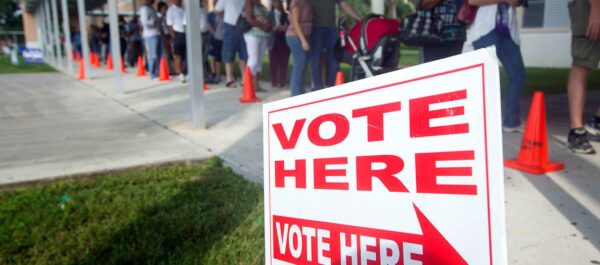
Florida
Dec 2023
Voting Rights
Supporting Defendants in Unlawful Florida Prosecutions of Returning Citizens (Amicus)
Florida has arrested and prosecuted many returning citizens—persons with felony convictions who are no longer incarcerated—for registering and voting while ineligible. These prosecutions have occurred amid widespread confusion about voting rights restoration in Florida and have been initiated by an Office of Statewide Prosecutor (“OSP”) that has no authority to bring these criminal actions.
Explore case
Florida
Dec 2023

Voting Rights
Supporting Defendants in Unlawful Florida Prosecutions of Returning Citizens (Amicus)
Florida has arrested and prosecuted many returning citizens—persons with felony convictions who are no longer incarcerated—for registering and voting while ineligible. These prosecutions have occurred amid widespread confusion about voting rights restoration in Florida and have been initiated by an Office of Statewide Prosecutor (“OSP”) that has no authority to bring these criminal actions.
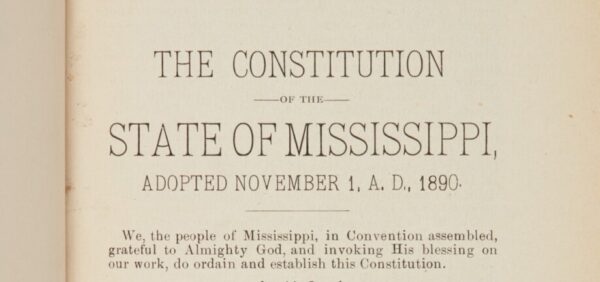
Mississippi
Dec 2023
Voting Rights
Hopkins v. Watson (Amicus)
Mississippi is home to one of the strictest felon disenfranchisement schemes in the nation. The Mississippi Constitution permanently disenfranchises citizens upon a single felony conviction for certain crimes, including minor offenses like writing a bad check. As a result, the loss of rights under Mississippi’s scheme is mandatory, permanent, and effectively irrevocable. In Hopkins, plaintiffs, a class of formerly incarcerated individuals who lost their right to vote despite completing their sentences, argued that their disenfranchisement violated the Eighth Amendment’s prohibition on cruel and unusual punishment. A three-judge panel of the U.S. Court of Appeals for the Fifth Circuit ruled in the plaintiffs’ favor and struck down Mississippi’s disenfranchisement scheme as cruel and unusual punishment. But the Fifth Circuit decided to rehear the case en banc, a rare occurrence in which a case is reconsidered by the entire panel of the circuit’s active judges.
Explore case
Mississippi
Dec 2023

Voting Rights
Hopkins v. Watson (Amicus)
Mississippi is home to one of the strictest felon disenfranchisement schemes in the nation. The Mississippi Constitution permanently disenfranchises citizens upon a single felony conviction for certain crimes, including minor offenses like writing a bad check. As a result, the loss of rights under Mississippi’s scheme is mandatory, permanent, and effectively irrevocable. In Hopkins, plaintiffs, a class of formerly incarcerated individuals who lost their right to vote despite completing their sentences, argued that their disenfranchisement violated the Eighth Amendment’s prohibition on cruel and unusual punishment. A three-judge panel of the U.S. Court of Appeals for the Fifth Circuit ruled in the plaintiffs’ favor and struck down Mississippi’s disenfranchisement scheme as cruel and unusual punishment. But the Fifth Circuit decided to rehear the case en banc, a rare occurrence in which a case is reconsidered by the entire panel of the circuit’s active judges.

New Hampshire Supreme Court
Dec 2023
Voting Rights
Brown v. Secretary of State (Amicus)
This case involved a state constitutional challenge to New Hampshire’s 2022 statewide Executive Council redistricting plan, which bore the hallmarks of a stark partisan gerrymander. The 51Ć·˛č and the 51Ć·˛č of New Hampshire filed an amicus brief in support of a challenge to the map in the New Hampshire Supreme Court.
Explore case
New Hampshire Supreme Court
Dec 2023

Voting Rights
Brown v. Secretary of State (Amicus)
This case involved a state constitutional challenge to New Hampshire’s 2022 statewide Executive Council redistricting plan, which bore the hallmarks of a stark partisan gerrymander. The 51Ć·˛č and the 51Ć·˛č of New Hampshire filed an amicus brief in support of a challenge to the map in the New Hampshire Supreme Court.

Ohio Supreme Court
Nov 2023
Voting Rights
League of Women Voters of Ohio v. Ohio Redistricting Commission (State House and Senate Challenge)
The 51Ć·˛č, 51Ć·˛č of Ohio, and Covington & Burling LLP filed a lawsuit on Sept. 23, 2021, in Ohio Supreme Court challenging Ohio’s newly drawn maps for state House and Senate districts that give extreme and unfair advantage to the Republican Party.
Explore case
Ohio Supreme Court
Nov 2023

Voting Rights
League of Women Voters of Ohio v. Ohio Redistricting Commission (State House and Senate Challenge)
The 51Ć·˛č, 51Ć·˛č of Ohio, and Covington & Burling LLP filed a lawsuit on Sept. 23, 2021, in Ohio Supreme Court challenging Ohio’s newly drawn maps for state House and Senate districts that give extreme and unfair advantage to the Republican Party.

Ohio Supreme Court
Nov 2023
Voting Rights
State of Ohio v. Urbanek (Amicus)
Mr. Edward Urbanek’s conviction is inconsistent with federal voting rights. Specifically, the federal Help America Vote Act (HAVA) requires that states allow a voter to complete a provisional ballot when their registration status or eligibility cannot be verified immediately. Under the Ohio courts' interpretation, any voter who completes a provisional ballot and is ultimately found ineligible is “attempting” to vote unlawfully. That interpretation would defeat the purpose of HAVA and provisional ballots.
Explore case
Ohio Supreme Court
Nov 2023

Voting Rights
State of Ohio v. Urbanek (Amicus)
Mr. Edward Urbanek’s conviction is inconsistent with federal voting rights. Specifically, the federal Help America Vote Act (HAVA) requires that states allow a voter to complete a provisional ballot when their registration status or eligibility cannot be verified immediately. Under the Ohio courts' interpretation, any voter who completes a provisional ballot and is ultimately found ineligible is “attempting” to vote unlawfully. That interpretation would defeat the purpose of HAVA and provisional ballots.
